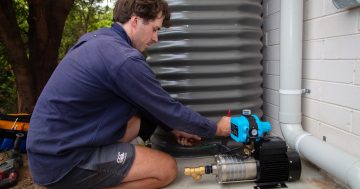
There’s more to this Budget than you think. Photo: Josie Elias.
Australians might be looking at a “sort of nothing budget”, but don’t let it fool you – from a tax and accounting perspective, there are lots of important takeaways for businesses and individuals.
RSM in Canberra Business Advisor Claudia Youngman says this year’s somewhat boring budget boils down to the need to balance managing inflation and the cost of living.
“This is being labelled a pre-election or band-aid budget with no real tax reform. There’s no structural change,” she says.
“It is designed to appeal to people who are feeling the cost of living crisis pinch, but at the same time, trying not to trigger inflation.
“As a result, we’re not seeing big incentives around business expenditure. It’s a sort of nothing budget.”
Underscoring this point, one of the most notable items in the budget for SMEs was a one-off $325 rebate against their electricity bills during the 2024-25 FY.
“I am sure a rebate like this doesn’t scratch the surface for businesses struggling to keep up with costs,” Claudia says.
The $20,000 Instant Asset Write-Off (IAWO) scheme has been extended again to 30 June 2025. This means Australian businesses with an annual turnover of less than $10 million can claim an immediate tax deduction for asset purchases up to the value of $20,000.
Before 1 July 2023, businesses with an aggregated annual turnover of up to $500 million were eligible for the IAWO.
“Currently stalled in Parliament are proposed measures for businesses with turnovers up to $50 million to be eligible to write off assets costing up to $30,000. It hasn’t been approved yet, leaving uncertainty for these businesses,” Claudia says.
“The hope is they’ll tie that up before 30 June, but in the meantime, we advise all SMEs to leave plenty of time between now and the end of the financial year to work closely with their accountants and ensure you are getting the most out of the accelerated depreciation rules in place.”
But while this budget has little upside for businesses overall in this budget, funding is available in some key areas that SMEs should be all over.
This includes $41.7 million in targeted support to improve SMEs’ cyber security preparedness, including access to free training and cyber security support services.
“SMEs are the biggest target of cyber security criminals, which in 2022-2023 cost small businesses an average of $46,000, medium businesses $97,200 and large businesses $71,600,” she said.
“For smaller businesses with tight margins, this can be devastating. Many are mum-and-dad businesses that worked so hard to get where they are but sadly don’t have the resources for cutting-edge cybersecurity systems. A cybercriminal will just as happily target four of those businesses as a single large business with more robust protections.”
Also, notably, SMEs will have access to $10.8 million in mental health support under the New Access for Small Business Owners Program and financial counselling services through an extension of the Small Business Debt Helpline.
There will also be a focus on supporting First Nations SMEs through increased capital leveraging opportunities and First Nations business procurements.

RSM in Canberra’s Claudia Youngman says the budget yielded “no real structural change”. Photo: Holly Williams.
With reduced confidence in the Big Four consultancies comes reduced measures and scrutiny that will help level the playing field for SMEs to tender for lucrative government contracts.
“With this, the government is trying to encourage a healthier level of competition, and that can only be good,” Claudia says.
The proposed “payday superannuation” proposal tipped for 1 July 2026, on the other hand, may come with unintended consequences, Claudia points out.
The proposal, which will require businesses to pay superannuation on the same day as an employee’s salary, could hinder SME cash flow.
“I can see why this is happening. Traditionally, when a business experiences cashflow problems, superannuation is often one of the first things they stop paying, and that can jeopardise an employee’s future,” she says.
“At the same time, if a business is set up to pay employees weekly and superannuation monthly, suddenly having to outlay both weekly can put a lot of pressure on cash flow. One outcome may be that these businesses will shift to monthly salary and super payments to avoid that cashflow pressure.”
Also controversial is the ATO’s move to increase the time they hold businesses’ refunds – such as activity statements and tax return payouts – from 14 to 30 days.
“This will hurt SMEs’ cashflow – it may mean tens of thousands of dollars they’re waiting on to reinvest in their businesses,” Claudia says.
Among the most notable items in the budget for individuals was the enactment of Stage Three tax cuts and relief for students.
Students with HELP and VET student loans will have those debts reduced, as interest will now be pegged to the lower of either the Consumer Price Index or the Wage Price Index.
“It reflects the government’s concern that students are entering the workforce in a vicious cycle where their debt is growing more quickly than their wages,” Claudia says.
For households, relief will come in the form of a one-off $300 rebate on their electricity bills and a slight increase to Commonwealth Rent Assistance for nearly 1 million households, with the maximum rate to increase by 10 per cent.
For more information, check out RSM Australia’s Key Insights.





















